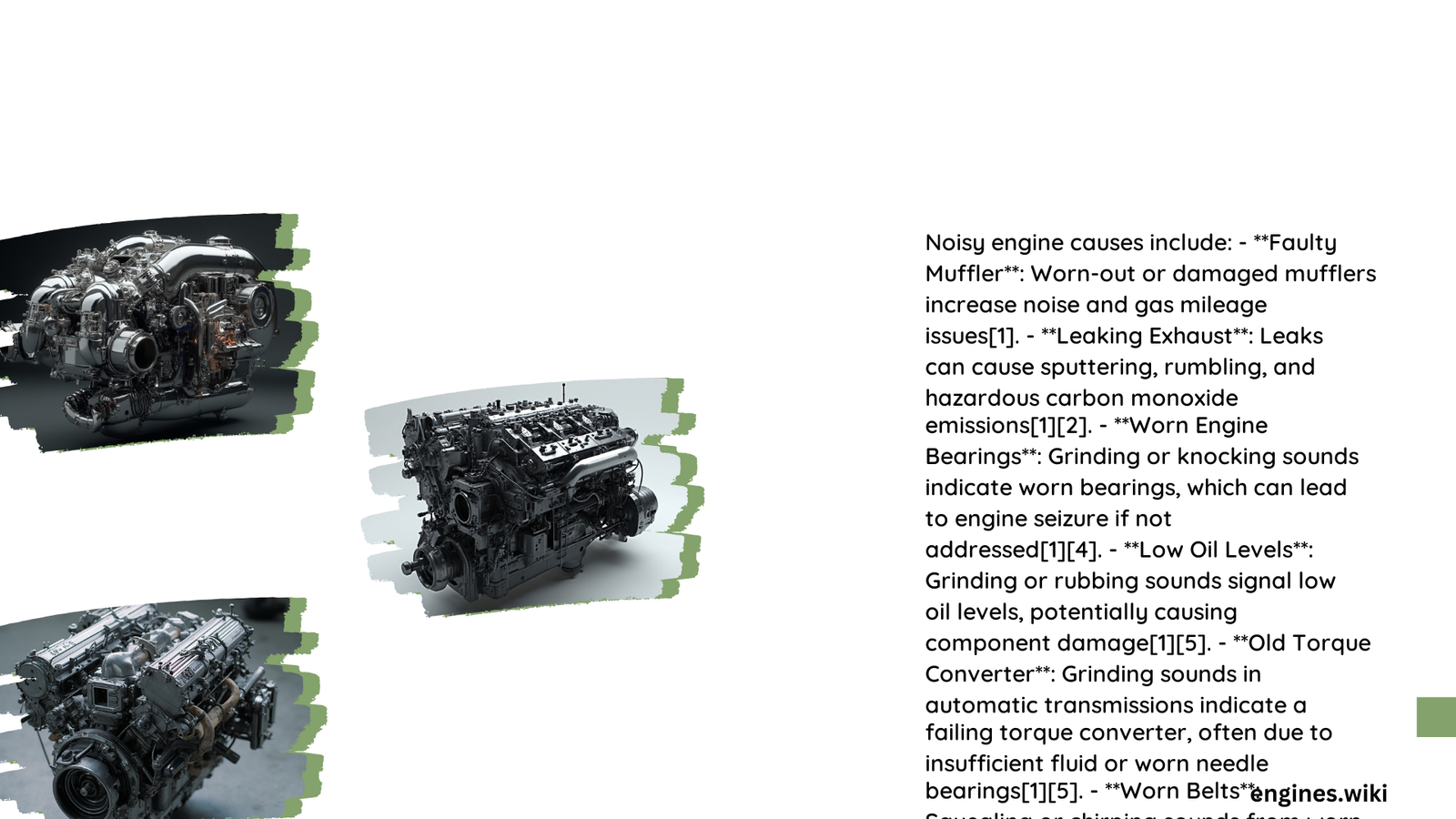Engine noise is a common issue that can indicate various problems in a vehicle. Understanding the causes of noisy engines is crucial for maintaining vehicle performance and preventing costly repairs. This article explores the main reasons behind engine noise, how to diagnose them, and their impact on vehicle performance.
What Are the Most Common Causes of Engine Noise?
Engine noise can stem from various sources, each with distinct characteristics and implications for vehicle health. Here are the top five causes of engine noise:
- Clicking & Tapping
- Cause: Low oil levels, worn-out lifters, or faulty hydraulic lash adjusters
- Noise Level: 70-90 dB
-
Conditions: Often heard during idle or when the engine is cold
-
Grinding
- Cause: Worn-out bearings, clutch issues, or suspension system problems
- Noise Level: 80-100 dB
-
Conditions: Noticeable during driving, idling, or when taking turns
-
Knocking
- Cause: Worn or loose rod bearings, or air-fuel mixture timing issues
- Noise Level: 80-100 dB or more
-
Conditions: Heard during acceleration or under heavy engine load
-
Hissing & Sizzling
- Cause: Fluid leaks (e.g., coolant) or vacuum leaks from the air intake
- Noise Level: 70-90 dB
-
Conditions: Heard when the engine is running, more pronounced during acceleration
-
Popping
- Cause: Ignition issues, damaged wires, clogged fuel filter, or dirty spark plugs
- Noise Level: 70-90 dB
- Conditions: Heard during engine operation, especially when accelerating
How Can You Diagnose Engine Noise?

Diagnosing engine noise requires a systematic approach. Follow these steps for an effective diagnosis:
- Initial Assessment (10-15 minutes)
- Listen carefully to determine noise location and characteristics
- Use a sound level meter if necessary
-
Review vehicle maintenance history
-
Visual Inspection (15-30 minutes)
- Check for leaks, wear, or damage
-
Use a flashlight and mirror for hard-to-reach areas
-
Oil and Fluid Checks (10-20 minutes)
- Verify oil level and condition
-
Inspect other fluids for leaks or contamination
-
Compression Test (30-60 minutes)
-
Use a compression test kit to check for cylinder issues
-
Spark Test (15-30 minutes)
-
Check for ignition issues using a spark tester
-
Exhaust System Inspection (20-40 minutes)
- Look for leaks or damage in the exhaust system
- Use a smoke machine if necessary
Total estimated diagnosis time: 1.5 to 3 hours
What Tools Are Needed for Engine Noise Diagnosis?
To effectively diagnose engine noise, you’ll need the following tools:
- Sound level meter
- Flashlight and mirror
- Oil dipstick and fluid test strips
- Compression test kit
- Spark tester
- Smoke machine (for exhaust system leaks)
How Do Different Engine Components Contribute to Noise?
Engine noise can originate from various components. Here’s a breakdown of common sources:
Mechanical Sources
- Worn-out Bearings: Grinding noises (80-100 dB)
- Lifters and Hydraulic Lash Adjusters: Clicking or tapping noises (70-90 dB)
Electrical Sources
- Ignition Issues: Popping noises (70-90 dB)
Exhaust System Sources
- Leaks or Damage: Hissing or sizzling noises (70-90 dB)
Other Sources
- Suspension System: Grinding noises (80-100 dB)
- Cooling System Leaks: Hissing or sizzling noises (70-90 dB)
What Is the Impact of Engine Noise on Vehicle Performance?
Engine noise can significantly affect vehicle performance:
- Horsepower Loss
- Worn-out bearings or ignition problems can decrease horsepower
-
A faulty ignition coil may reduce engine performance by 10-20%
-
Fuel Efficiency Impact
- Exhaust system leaks or air-fuel mixture timing issues can decrease fuel efficiency
-
A clogged fuel filter can reduce fuel efficiency by 5-10%
-
Cause-and-Effect Dynamics
- Low oil levels can cause tapping noises and lead to increased engine wear
- Increased wear can result in higher fuel consumption and reduced performance
How Much Do Engine Noise Repairs Typically Cost?
Repair costs for engine noise issues can vary widely depending on the cause:
| Issue | Potential Cost |
|---|---|
| Worn-out Bearings | $500-$2,000 |
| Lifters and Hydraulic Lash Adjusters | $300-$1,000 |
| Ignition Issues | $100-$1,000 |
| Exhaust System Repairs | $100-$1,500 |
| Suspension System Repairs | $200-$1,000 |
| Cooling System Repairs | $100-$1,500 |
It’s important to address engine noise promptly to prevent more extensive and costly damage.
